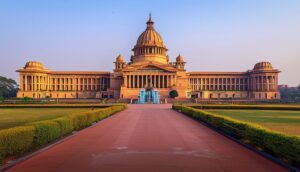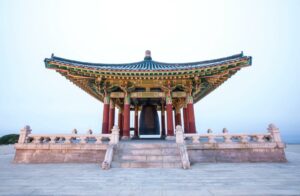Former Prime Minister Hwang Kyo-ahn raised concerns over the integrity of South Korea's recent elections, accusing the Chinese Communist Party (CCP) and North Korea of manipulating electoral outcomes in favor of the Democratic Party of Korea (DPK). Hwang alleged that individuals within the DPK were linked to espionage activities for North Korea and accused specific former and current members of misconduct.
Establishing a verifiable link between the alleged electoral malpractices and foreign interventions has proven complex. Hwang alluded to technological meddlings with electoral systems, referring to the discovery of WiFi signals from Huawei during a scrutinization effort. He also pointed out statistical anomalies in voting results, suggesting that these deviations were due to fraudulent manipulation.
Hwang activated a civilian group titled "EJA·Election Justice Army" to monitor poll activities and expose any corrupt practices. Despite his efforts, South Korean election authorities and third-party observers stated that available evidence could not substantiate the claims of election tampering. Court rulings on related cases dismissed claims of systemic vote manipulation, emphasizing that no pervasive fraud was demonstrable.
Election authorities adhere to their procedures and guidelines, proclaiming effectiveness in preventing illegitimate interferences while highlighting control mechanisms designed to shield electoral processes from manipulation or external meddling. Thorough scrutiny seemed to sustain a view signaling minimal tactical breaches, thus substantiating system robustness. Within this barrage of claims and counterclaims, observers and citizens alike tread cautiously on narratives, seeking transparent legitimacy amidst allegations shaking the bedrock of democratic ethos in South Korea.

The discovery of Huawei WiFi signals during the review of the election's technological integrity sparked concerns about potential external infiltrations into the election infrastructure. Lawyer Park Joo-hyun's assertion introduced a technological dimension to the electoral authenticity discourse, casting doubt over the procedural sanctity of elections.
South Korea's electoral system employs secure algorithms dedicated to validating voter data integrity while safeguarding against unauthorized system access. The rapid advancement into digital alternatives coexists with skepticism about costly equipment and fears of hi-tech fabrications. Each side presents arguments validating or voiding results, referring to guidelines maintained by domestic supervisory entities and globally recognized standards for electoral processes.
Legal settings have addressed viewpoints around technology-assisted evidence, interpreting the feasibility of election influencing through engineered signal interventions. The Supreme Court declined substantive results pinning fraud, fortified by reported no-irregularity standards approved by overseers. Such responses by higher authorities influence public trust, sifting voter confidence through explanations of digital safety measures.
The presence of technologies cited by Joo-hyun is exceptional to institutional trust, binding civic fabrics to newer examination shifts aligned across echelons of judicial revelations and technical gradience exhibits. Election discourse now rests significantly on dynamics shading within curricula featuring broader systemic harmonies tuned to address risks potentiated through every tech pulse held accountable. Ultimately, the choreography staged within these technological ledges delivers verdicts of machine perceptions and hosts factual clarity iterations before a public scrutinizing inherent looming established to uphold democracy's channels.

In South Korea, the alleged election malpractices have sparked a vigorous public outcry, leading to protests and debate within political corridors and amongst ordinary citizens. The revelation of questionable voting patterns and disputed technological findings has led to mass gatherings, especially in urban centers such as Seoul, signaling a deep-rooted skepticism towards the election mechanisms.
Within the political landscape, these allegations have sharpened partisan divisions, with both the People Power Party and the Democratic Party harnessing the upheavals to bolster their narratives and fortify base mobilizations. The People Power Party decries perceived irregularities as threats to democracy, while the Democratic Party frames the discourse around attempts to delegitimize their governance.
Globally, the murmur of electoral discrepancies in South Korea has gripped the attention of various international entities. Election monitoring organizations watch keenly, with statements from global watchdogs urging thorough investigations while scrutinizing South Korea's adherence to international standards of electoral fairness and transparency. Human Rights Watch posits these allegations as focal points for global discussions on burgeoning democracy in the tech era1, indicating a ripening concern widening the scrutiny lens beyond national barriers.
Significant public demonstrations mirror historic protests seen with previous administrations, echoing longstanding traditions of powerful civilian oversight entrenched in South Korean democratic culture. Each gathering demands accountability and policy dissections linked to the tenets of trust governance.
These waves of discomfort obliterate borders, arousing satellite debates within Asian politico circles and monitoring stability metrics marked by the region's political heartbeat. The geographically adjoining regions shadow these political quakes through ingrained diplomatic watchers.
At this juncture, where civic batteries are energized by demands for clarity and digital trails are surveyed amidst calls for authoritative openness, reactionary calibration ushers in anticipated conscientious global responses reflecting a shared stake in herald judicative democracy titrations. South Korea stands as a vibrant beacon under observation, advocated and amplified by global chants engaging democratic populations around annual rings instancing democratic values forging reflective censuses portraying enlisted monumental democratic significances.
- Human Rights Watch. South Korea: Alleged Election Malpractices Spark Global Concerns. Human Rights Watch. 2023.




